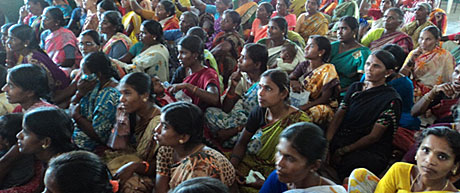Enhancing livelihood security for Dalit women
Date:

Dalit Women’s Empowerment event convened by Dalit Sthree Sakthi, Moinabad Mandal, 28 April 2012
Moinabad/Andhra Pradesh - On a hot April day, Ratna Ma and several other Dalit women from villages in Ranga Reddy District in Andhra Pradesh convened in a school hall. Their objective was clear – they were meeting to draw attention to the plight faced by many Dalit women in securing work under India’s much-talked about Mahatma Gandhi National Rural Employment Guarantee Act (MGNREGA) 2005. Organised by Dalit Sthree Sakthi (DSS), the event was part of a UN Women funded programme to encourage Dalit women to access work under MGNREGA.
Regarded as one of India’s flagship poverty reduction programmes, the MGNREGA differs from state-to-state. Under the scheme, anybody who seeks wishes to do work is guaranteed 100 days of pay. The Act gives equal wages to women and men alike, irrespective of caste, helping to change the usual practice in India where women are paid less than men for the same work.
Ratna Ma: Fighting for her rights
Dalit women of Moinabad Mandal, however, receive little success in securing work under MGNREGA. Ratna Ma says her demands for work under MGNREGA to Mandal officials have so far been unanswered. She explains the triple discrimination she experienced: “I am a single widowed woman, on top of that, I am a Dalit, so it is always difficult to find work – no one wants to employ you”.
Unlike many others, Ratna Ma possesses half an acre of land where she plants paddy and grows flowers. Apart from tending to her small landholding, she works for other landowners for a payment of 60 rupees per day. Under MGNREGA, Ratna Ma will be entitled to a minimum wage of Rs. 100. Ratna Ma says she has been given a job card which entitles her to work under the scheme but no work has come her way.
Ratna Ma has attended workshops held by DSS on three occasions in the past one year. “It was the first time Dalit women had come together to discuss important issues, ” says Ranta Ma, as she attended the Moinabad Mandal Development Office to demand work under MGNREGA with Bina, a staff member of DSS.
Ratna Ma has two sons, a 23 and 20 year old, who are also dependent on her. “It’s frustrating when the next generation also have to sit idle. Caste is the main obstacle for me and my sons not getting work under MGNREGA,” she states angrily.
Ratna Ma says “so far nothing has been solved”. Yet, Ratna Ma is prepared to go to any level to fight for her rights. “I am prepared to go to the Chief Minister. Under MGNREGA, I could work at the Angan Wadi centres, look after children or help in serving midday meals to school children. I can also be paid to work on my small landholding which will be eligible as ‘work’ under MGNREGA.”
The event ended on a high note echoing the determination of women like Ratna Ma.